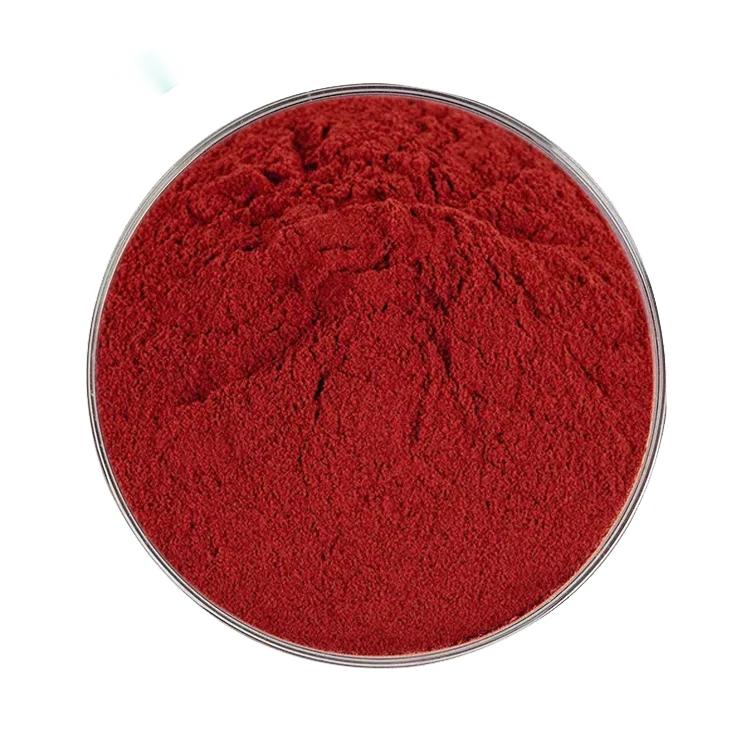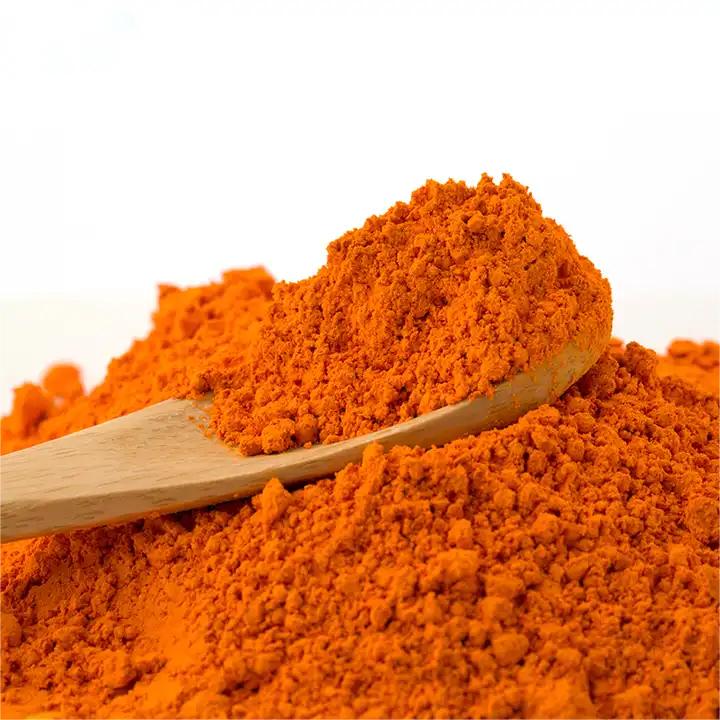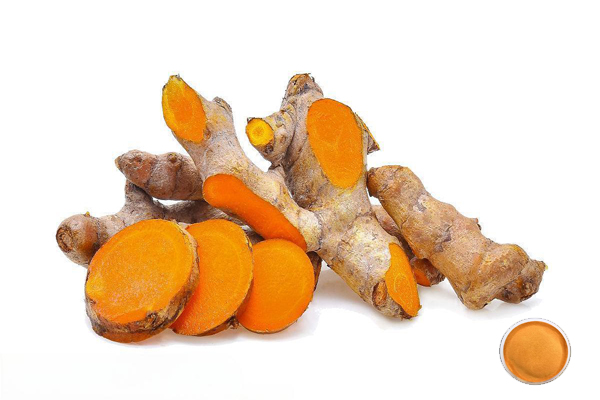Poudre lycopène en vrac 10% par HPLC
Nom de produit :Lycopene
CAS non. Téléphone :502-65-8
Analyse: 10%
Méthode d’essai :HPLC
Apparence: poudre rouge foncé
Résidu de Pesticide: conforme à la norme (ce) No 396/2005
- Description Description
- Fiche technique
- Certificat de formation
-
Qu’est-ce que la poudre de lycopène en vrac?
lycopèneis a carotenoid found in plants and is the main pigment in ripe tomatoes. It is called lycopene because it was first isolated from tomatoes. lycopène is widely found in red fruits such as tomatoes, watermelon, grapefruit, etc. (except cherries and strawberries), and is considered to be one of the "powerful antioxidants". It is a natural pigment contained in plants. It is found mainly in the ripe fruit of tomatoes in the Solanaceae family.
The chemical structure of lycopene has a large number of unsaturated double bonds inside, which can effectively absorb long-wave and quench single-linear oxygen, and therefore has a strong antioxidant capacity. In addition to its use as a pigment in food and pharmaceuticals, lycopene powder can improve cardiovascular health, prevent oxidative damage and oxidative stress, treat systemic inflammation, and prevent prostate cancer as well as vascular complications in diabetes, among other functions.
Green Spring supplies Lycopene Powder 10% de réduction by HPLC/HPLC with microencapsulation technology, high absorption rate, no pesticide residue, and low solvent residue.
Fondée en 2000, Green Spring Technology s’engage à fournir à ses clients des extraits de plantes naturels, sûrs et biologiques. Nous avons passé Halal, casher, COSMOS, BRC, IFS, FDA, ISO et beaucoup d’autres certifications. Nous appliquons strictement le système de gestion de la qualité et organisons la production selon oin, HACCP et d’autres normes de qualité. Nous avons un processus interne rigoureux de contrôle de qualité pour nous assurer que nous répondons aux normes internationales telles que la pharmacopée européenne, la pharmacopée américaine, la pharmacopée japonaise et ainsi de suite. Nous pouvons fournir des rapports des essais faisant autorité de tiers.
Spécification:
Nom du produit
Lycopene
CAS non.
Numéro de téléphone: 502-65-8
spécification
10%
Méthode d’essai
HPLC
apparence
Poudre rouge foncé
Résidus de pesticides
Conforme à la norme (ce) n ° 396/2005
Règlement:
Il est conforme à la réglementation de l’ue.
Vous cherchez un devis?Benefits:
Anti-cancer
As early as the 1950s, American medical experts reported that lycopene has anti-cancer effects. Later, through human cell line tissue culture, animal experiments, and epidemiological investigations, it was found that lycopene powder has the effect of preventing and inhibiting malignant tumors and cancers, and has a significant effect on prostate cancer.
Harvard Public School of Medicine Giovannucci et al. published that the intake of tomato products can reduce the incidence of prostate cancer epidemiological study proved that regular tomato eaters than infrequent tomato eaters the chance of prostate cancer by 45%. Vaishampayan et al. conducted a clinical trial on 71 prostate cancer patients who were injected with tomato extract containing 15 mg of lycopene powder twice daily for six months. The results found that prostate-specific antigen (PSA) levels remained stable during and after cancer treatment, thus reducing the risk of cancer recurrence.
Tao Zhang et al. found that the inhibitory proliferative effect of lycopene on human prostate PC-3 cells was associated with G0/G1 phase blockade and its molecular mechanism may be related to the regulation of P21WAF1 expression. However, some studies have also found that there is no protective association between lycopene and prostate cancer as previously reported, and an epidemiologic investigation by Peters et al. showed that lycopene powder is not effective in preventing prostate cancer.
Improve Prostate Function
Lycopene can break through the prostate absorption barrier and enter the gland directly to play a role. Lycopene powder can inhibit the proliferation of prostate epithelial cells, promote apoptosis of hyperplastic prostate tissue, inhibit the prostate from continuing to grow larger, no longer press on the bladder, and relieve symptoms such as frequent urination and urgency.
Improve Sperm Quality
Lycopene scavenges free radicals, protects sperm from oxidation, and improves sperm concentration and vitality.
Reducing the Risk of Cardiovascular Disease
The results of existing studies suggest that lycopene powder supplementation has a positive effect on preventing the development of cardiovascular disease. There were 2 meta-analyses of large-scale prospective studies in 2019: one found that people with a lycopene powder intake higher than 9.81 mg per day had a 26%, 37%, and 14% lower risk of stroke, death, and cardiovascular disease, respectively. Another study found that people with a dietary lycopene powder intake of more than 15 mg per day had a 17% lower risk of cardiovascular disease compared to those with less than 3 mg per day. The above are observational studies representing only correlations, but intervention studies are also available.
In 2020, a meta-analysis of 1 intervention study of lycopene powder supplementation showed that 4-50 mg of lycopene per day lowered LDL cholesterol levels, while another meta-analysis of 5 intervention studies in 2021 found that supplementation with 10-15 mg of lycopene powder per day in the form of tomato extract was effective at lowering systolic blood pressure, with a total of 216 people in the intervention group (and 146 people in the placebo control) having an average reduction of 5.68 mm Hg. people in the intervention group had an average reduction of 5.68 mmHg (and 146 people in the placebo control). Mechanistically, this may be due to the antioxidant effects of lycopene on biomolecules (DNA, proteins, and lipids) in the body and the modulation of inflammation-related factors.
Applications:
For Health Products:
Lycopene has not only anti-cancer and anti-cancer effects but also the prevention of cardiovascular disease, atherosclerosis, and other adult diseases, enhances the human immune system, and delays aging, which are of great significance. The U.S. and Japan have successively produced medicines with lycopene powder as the main active ingredient, whose main role is to lower blood pressure, treat high cholesterol, and high blood fat, and reduce the activity of cancer cells.
In the United States and France, there are lycopene pwoder products for the prevention of prostate cancer. In Israel and Australia, there are products for the prevention of ultraviolet burns, skin protection, and skin care, and for lycopene functional products, carotenoid complex products, which are usually capsules or liquids.
In the Food Field:
Lycopene powder can be added to foods and beverages such as jams, juices, dairy products, meat products, baked goods, confectionery, meal replacements, and other foods and beverages as a pigment, nutritional enhancer, and other ingredients.
-
Get Your Free COA
-
Télécharger le document
Cosmos Green Spring Technology
Télécharger le documentHalal Green Spring Technology
Télécharger le documentKosher Green Spring Technology


 Anglais
Anglais français
français espagnol
espagnol russe
russe coréen
coréen japonais
japonais












